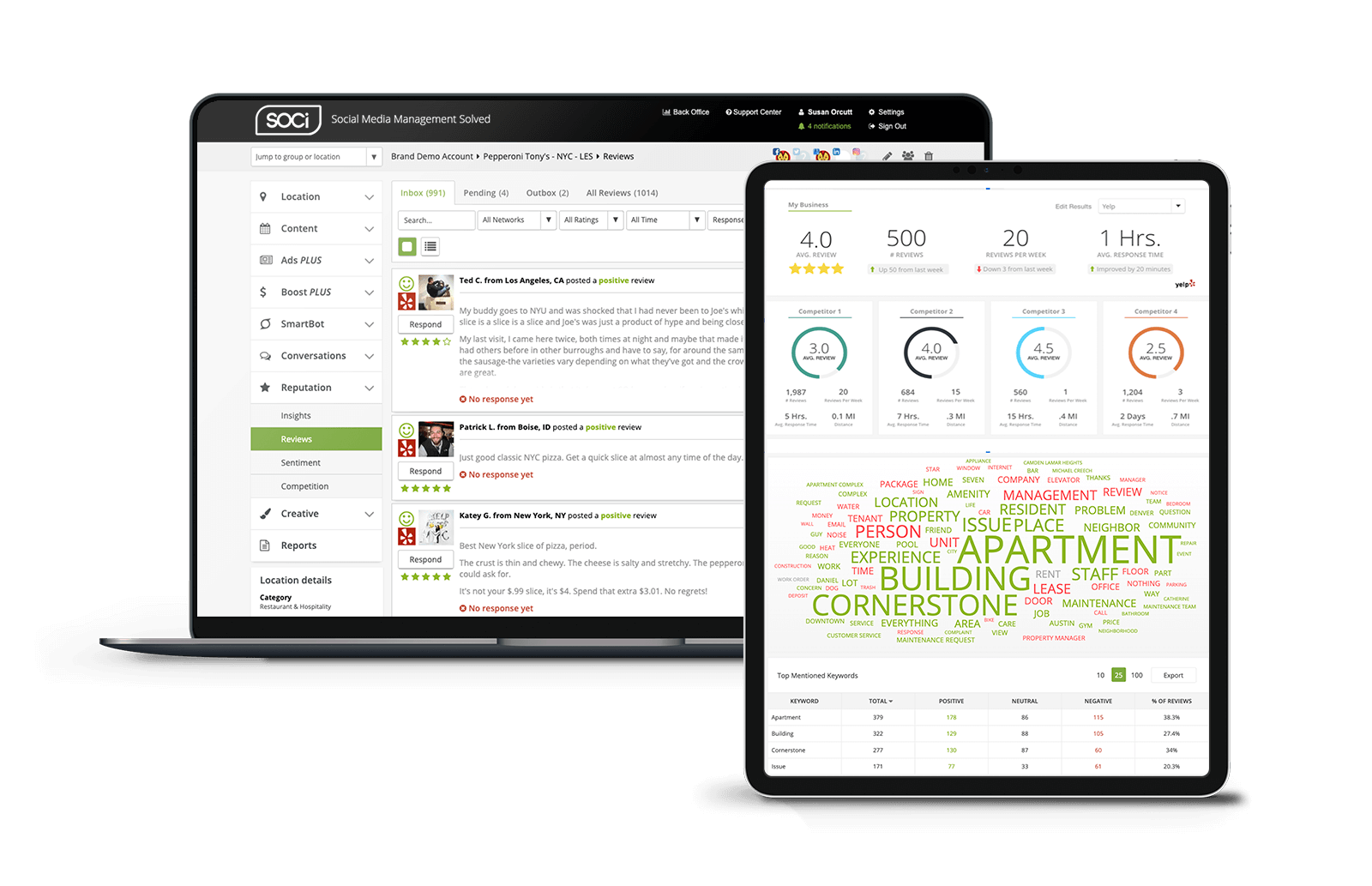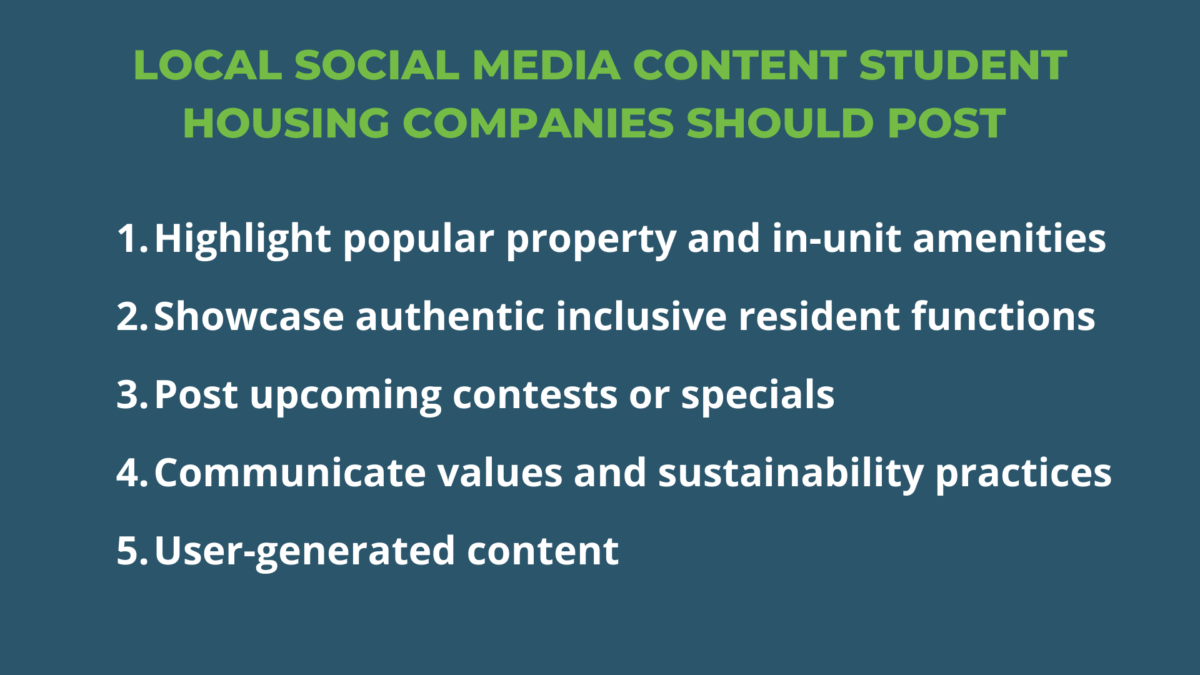The 5 Best Ways to Maintain Your Student Housing Properties’ Online Reputation
Table of Contents
Today, nearly all college students belong to Generation Z (commonly referred to as Gen Z). Gen Z is highly tech-savvy, with 44 percent stating they are comfortable using the latest technology. Moreover, Gen Zers spend over eight hours a day online.
If you’re a student housing company, a strong online presence is a must. More importantly, you need an excellent online reputation management system to attract new residents and retain current ones. Our blog post covers the top tactics student housing companies can implement to improve their online reputation.
What is Online Reputation Management?
Online reputation management is the process of monitoring and influencing your student housing company’s online presence. It includes monitoring and responding to reviews, addressing social media engagements, and asking residents to leave user-generated content.
Below are five online reputation management tactics that student housing companies can implement to gain more residents and improve resident retention.
1. Install a Review Response System
In 2021, 77 percent of consumers either “always” or “regularly” read online reviews when browsing for a local business. According to the same study, only two percent of consumers “never” read online reviews. Gen Z is no different. They rely heavily on online reviews when making a purchase decision — over two-thirds of Gen Z read at least three reviews before making a first-time online purchase.
Online reviews matter to consumers today, particularly Gen Z. Therefore, as a student housing company, it’s essential to receive and respond to reviews. Here’s a step-by-step guide for setting up a review response system.
How to Prioritize Responding to Reviews
An individual student housing community might have multiple years’ worth of unresponded reviews. If a review is more than six months old, don’t worry about going back and responding to it, unless it addresses an issue that has since been resolved. Many of those residents have moved out of your properties, and their reviews are behind much more recent and time-sensitive reviews.
For context, according to our 2022 Local Visibility Ranking Report for Property Management Companies, student housing companies take on average this long to respond to reviews depending on the platform:
- Yelp, 24.1 days
- Facebook, 42.5 days
- Google, 44.4 days
Note, while these are benchmarks for student housing companies, it’s best practice to respond to reviews as soon as possible.
It’s also best to prioritize the most recent reviews. Current residents expect timely responses, and potential residents are investigating to see if you’re responding. Generally, review response is an everyday activity. The longer you wait to respond, the less likely you’ll change that reviewer’s perception of your property.
How to Respond to Negative Reviews
If you appropriately respond to a negative review, there’s a high likelihood that the reviewer will change their review. Our previous research found that 87 percent of consumers express a willingness to change a negative review, depending on how the business responds.
When responding to negative reviews, it’s best to not take negative reviews personally. Assume the reviewer means well and they’re raising residential pain points. In general, negative reviews fall into one of these three categories:
- The resident received poor customer service.
- The resident was unhappy with the quality of their unit or the property.
- The resident was dissatisfied with circumstances outside of your control.
For all three categories, it’s best to begin by apologizing for mistakes or miscommunications that might have led to the negative review. Then, discuss changes you plan to make or have already implemented to resolve the issue(s). Lastly, give the current or former resident a way to contact you. Here’s an example of how to respond to a negative review:
“Hello [Reviewer Name], thank you for choosing to live with us and taking the time to share your experiences. We’re sorry that [the specific issue or service] didn’t meet your expectations. We’ve looked into the issue and taken [X, Y, Z] actions. Please feel free to reach out to us at [office phone number] or stop by the leasing office so we can further assist you.”
How to Respond to Positive Reviews
Prioritize responding to negative reviews, but if time and resources allow, it’s also important to respond to positive reviews. When a property responds to all reviews, not just negative reviews, it often motivates current and former residents to leave more positive reviews.
A positive review response should thank the reviewer by name for being a resident and personalize the response by mentioning the subject matter in the response. Personalization is key.
Reviews that include a rating but no text, which are especially common on Google, don’t always need a response. These ratings will still contribute to consumer perception and to your average star rating on the site where they appear, but it can be challenging to come up with variations of, “Thanks for the great rating!” that sounds authentic and sincere.
If you need more detailed information on how to respond to reviews at your various properties, download our Guide to Online Reputation Management for Property Management Companies.
The Best Review Management Software
As a student housing company with multiple locations, it’s challenging to keep track of and respond to the reviews your properties receive daily. You need the right software in place. SOCi Reviews can help.
SOCi Reviews empowers both local and corporate teams to efficiently create personalized responses to reviews on all significant review sites. As mentioned, this review response improves resident satisfaction and attracts new renters.
Furthermore, SOCi’s reputation management software can help your student housing company identify and manage emerging sentiment trends from online reviews, which you can use in future marketing and advertising campaigns.
2. Utilize User-Generated Content
Student housing companies can bolster their online reputation through user-generated content (UGC). UGC is content in any form — reviews, images, videos, reels, etc. — created by consumers and published to an online search or social network.
Because UGC comes from current or former residents, who potential residents often perceive as peers, it feels more authentic than branded content. A recent survey revealed that 80 percent of consumers say UGC highly impacts purchase decisions — 8.7x more than influencer content and 6.6x more than branded content.
If residents post UGC organically, ask them to tag your local social pages or geotag their location. Also, don’t be afraid to ask residents to post UGC, especially if they’ve recently left a positive review. Your student housing company can leverage existing UGC to create their own:
- Review and testimonial pages
- Blog posts
- Q&A forums
- Case studies
The above-listed UGC can take the format of text, pictures, or videos. With residents’ permission, it’s important to post this material not only on social media but also on your website and local landing pages. Sixty-four percent of Gen Z won’t buy something from a site that has no consumer photos or reviews.
Are you having trouble finding UGC online or getting volunteers? Hold a contest amongst your residents. You can ask residents to post a photo or video of themselves enjoying your property’s amenities and have them tag your social handle in the post to enter a raffle. The prize can vary from a lease voucher to a physical gift.
3. Be Active and Relatable on Social Media
According to the World Economic Forum, most Gen Zers in North America spend an average of 2:03 hours daily on social media. And nearly nine out of 10 Gen Zers use social media to find new brands to follow and engage with.
Consumers today, particularly Gen Z, care about local content and connecting with brands. Localized content receives 12x the engagement rate of more general or “non-localized content.” Therefore, each of your individual properties should have their own social media pages.
Gen Z also prefers brands that are inclusive and have sustainable practices. Ninety-two percent of Gen Z consumers prefer products or businesses that promote sustainable business practices. Additionally, over half of Gen Zers want brands to support broader inclusivity initiatives.
We recommend posting the following social media content to boost your student housing company’s online reputation.
Lastly, similar to responding to online reviews, we recommend replying to all social media engagements. These responses make current residents feel cared for and shows potential residents you interact with residents and are approachable.
4. Have a FAQ Section for Parents and Family Members
College students aren’t the only ones frequently perusing your properties’ websites. Parents and guardians of college students are often doing their own research on your property. These parents and family members are an important target audience to address since they’re likely to sign on as a guarantor or co-signer.
We recommend having a dedicated FAQ page for parents and family members that showcases or covers:
- Safety and security concerns
- The surrounding neighborhood
- A student-focused environment
- Management and maintenance
- Affordability
- Guarantor and co-signing options
- Roommate matching possibilities
You can also showcase this information on your local social channels. By providing guardians with the information they care about, they’ll be more likely to be on board with your property — especially if those details aren’t easily accessible from the competition.
5. Let Insights From Reviews Influence Your Property’s Updates and Changes
Last but not least, student housing communities should use the data and insights from online reviews and social media engagements to influence their properties’ updates and changes.
For example, if multiple reviews discuss safety around a property being an issue or primary concern, you’ll want to add more safety features such as keypad or fob entries, extra video surveillance, and hired security. We recommend addressing reviews immediately, noting changes you plan to make, and then following up again after installing these updates.
Not only will data from online reviews influence your property’s updates, but it can also influence your online and social media content strategy. Let prospective residents know about changes you’ve made on your website, local landing pages, and social media accounts.
If current and future residents see that your student housing property pays attention to resident concerns and takes action, it will help increase your chances of winning a new or re-signed lease.
Reputation Management Tools for Student Housing Companies
The information above can help you start improving your student housing company’s online reputation, but you need the best-in-class software and tools to manage the numerous online reviews and social media engagements your properties receive. As mentioned, SOCi’s tools can help.
SOCi Reviews makes it easy to track and respond to online reviews across all major review sites. It also has sentiment analysis capabilities to analyze patterns across your and your competitor’s properties.
In addition, SOCi Social can help you deploy localized social content across all of your properties while maintaining brand consistency. It also provides insight into performance to ensure each property’s content gets the most engagement, further boosting your online reputation.
With SOCi, your student housing company can maintain a strong online reputation, and win more leases. Request a demo for more insight into how SOCi can help your student housing company achieve localized marketing success!



